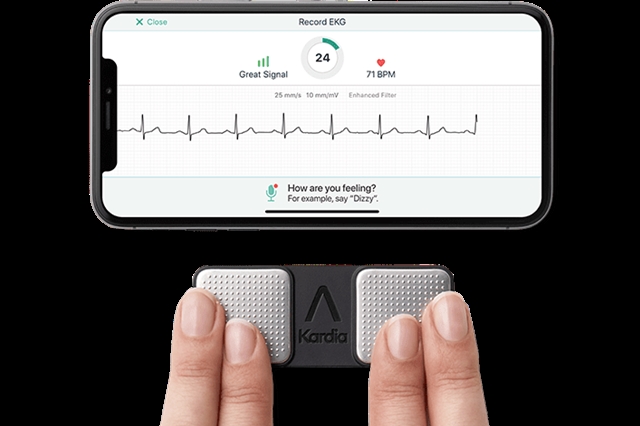12 November 2018. A smartphone app that monitors heart functions like an electrocardiogram, or EKG, can detect a dangerous form of heart attack, according to results of a clinical trial. Findings from the study were presented on Saturday at the annual Scientific Sessions meeting of American Heart Association in Chicago.
A research team from several sites in the U.S. and Argentina tested the EKG device and app developed by AliveCor, a medical device company in Mountain View, California. The system, known as KardiaMobile, attaches to Apple or Android phones to measure electrical impulses traveling through the heart as it beats. This information, like that from an EKG, is usually collected by a non-invasive test given at a doctor’s office or hospital with 12 electrodes attached to the patient’s body.
For KardiaMobile, the information is captured with two fingers of each hand placed on pads in a small panel attached to a smartphone for 30 seconds. The phone displays and analyzes the readings with a built-in algorithm for signs of irregular heart beats and sends the results to a physician. FDA cleared the KardiaMobile system to monitor heart signals for irregular heart rhythms, such as atrial fibrillation.
In this case, researchers led by cardiologist J. Brent Muhlestein at Intermountain Medical Center Heart Institute in Utah are testing KardiaMobile as a device to detect ST-elevation myocardial infarction, or Stemi, a heart attack where the artery is completely blocked. Stemi is considered a dangerous, life-threatening, and time-sensitive emergency that needs to be quickly diagnosed and treated.
Muhlestein and colleagues are investigating KardiaMobile as a way of saving precious time if Stemi occurs. “The sooner you can get the artery open,” says Muhlestein in an Intermountain statement, “the better the patient is going to do. We found this app may dramatically speed things up and save your life.”
The clinical trial tested KardiaMobile along with standard EKG systems among 204 individuals, with an average of 60, reported chest pains at Intermountain Health Care in Utah, Mayo Clinic in Rochester, Minnesota, and 3 other locations. Patients admitted for chest pains were checked by both types of devices, and 3 independent clinicians interpreted the results as Stemi attacks, non-Stemi conditions, or unable to interpret, without knowing if the readings were made by a conventional EKG or KardiaMobile. For this study, the MobileKardia attachment was used to check heart signals from several angles on the body, simulating a conventional EKG.
The results show the KardiaMobile system and EKG machines accurately agreed on a Stemi diagnosis 89 percent of the time, while agreeing on a non-Stemi condition 84 percent. The results also show positive and negative predictive values of 70 and 95 percent respectively. Qualitative judgements by the review panel likewise show a good correlation, 79%, between the two detection systems.
The findings suggest the smartphone-connected device can serve a useful screening function for serious heart diseases, such as Stemi. The team envisions a scenario where an individual experiencing chest pains uses a mobile device to report the condition, with the results sent to the cloud and interpreted by clinicians. If the data show a possible heart attack, the person would be told to get to a hospital immediately.
“If somebody gets chest pain and they haven’t ever had chest pain before, they might think it’s just a bug or it’s gas and they won’t go to the emergency room,” notes Muhlestein. “That’s dangerous, because the faster we open the blocked artery, the better the patient’s outcome will be.”
More from Science & Enterprise:
- Trial Testing Smartwatch to Detect Heart Rhythm Problems
- Multiple Sensors, A.I. Power Digital Stethoscope
- Univ. Spin-Off Developing A.I.-Boosted Heart Monitor
- Non-Invasive Imaging Technology Probes Deeper Into Tissue
- Trial Shows Patch Feasible for Heart Rhythm Detection
* * *


 RSS - Posts
RSS - Posts
You must be logged in to post a comment.